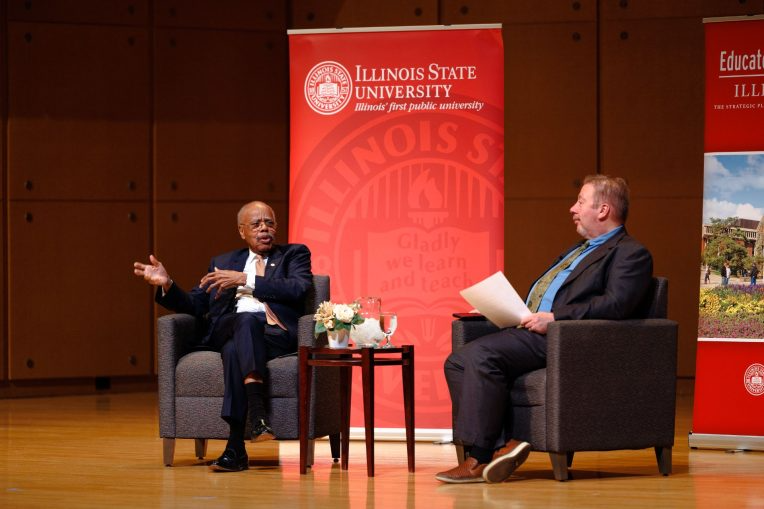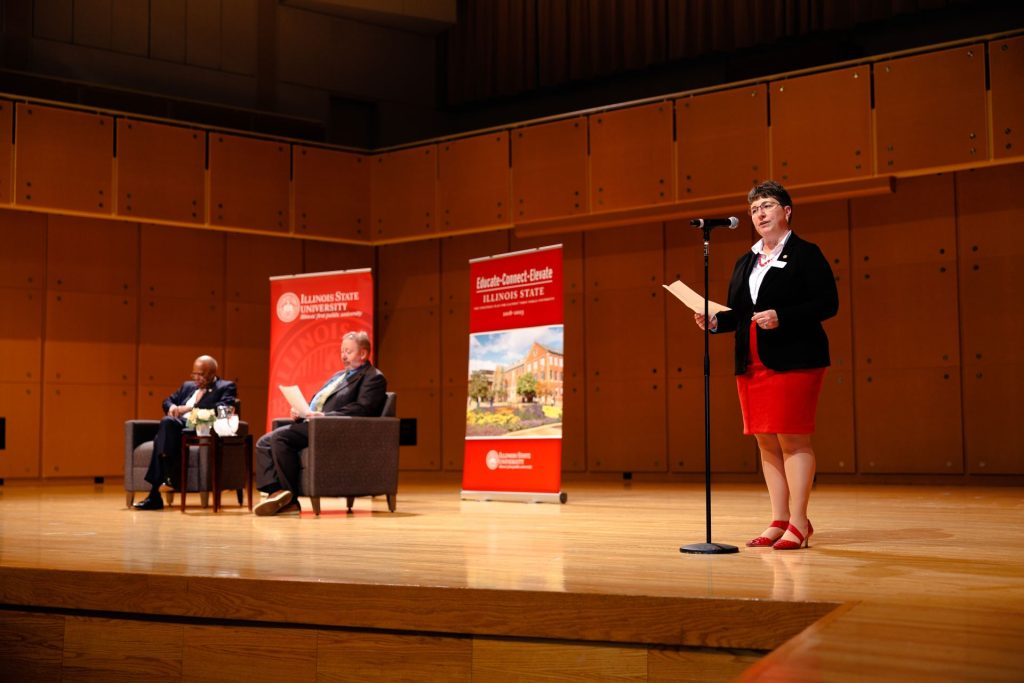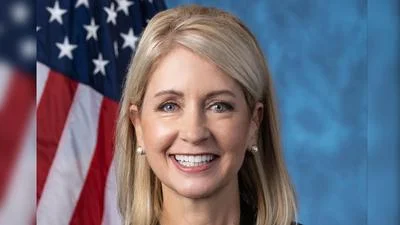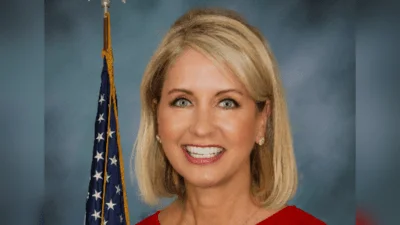
Distinguished Alum Donald McHenry, left, makes a point with WGLT's Charlie Schlenker during the Stevenson Lecture at the Center for the Performing Arts Concert Hall on November 17.
Distinguished Alum Donald F. McHenry ’57, a native of East St. Louis and a career diplomat, who was a member of President Jimmy Carter’s Cabinet and served as ambassador and permanent representative to the United Nations, was the speaker for the Adlai E. Stevenson II Memorial Lecture Series at the Center for the Performing Arts on November 17.
In a wide-ranging Q&A, moderated by WGLT’S Charlie Schlenker, McHenry touched on a number of topics, including: U.S. foreign policy; COVID-19; Russia and its leader, Vladimir Putin; Ukraine; China; Taiwan; climate change; and the midterm elections, to name a few.
On the subject of American foreign policy, McHenry offered a blunt assessment.
“We’ve got to get our act together in the United States,” he said. “We are expected by many around the world to be strong ourselves so that they can depend upon us in time of need. You cannot exercise power or responsibility if you yourself are weak or your institutions are at risk.”
McHenry said the U.S. must meet its responsibilities and not expect the world to stop while it goes through whatever is necessary to regain its position of strength around the world.
“We cannot say, ‘Stop the world I want to get off,’ nor can you say, ‘Wait until we get our act together,’” McHenry said. “We have to learn to do both at the same time.”
Democracy, he said, depends on a certain degree of harmony within society and depending upon one another.
“It takes time to restore confidence in our institutions once they have been weakened,” McHenry said. “Time is something that we don’t have very much patience for.”
He warned that even the United States needs partners, particularly in light of a pandemic that is not completely resolved.
“We are not on this planet alone, and we cannot resolve the problems we face alone,” he said. “If you don’t believe it, look at COVID. We remain from this day vulnerable to the fact that COVID is re-arming itself in various parts of the world which are unvaccinated.”
He added that COVID-19 is only one example of the fact that the world is very interdependent. COVID showed the danger of excessiveness, he said.
“Globalization is a great thing,” he said. “It takes advantage of the interdependence of the international community, but globalization overdone is dangerous.”
He pointed to the country’s difficulty protecting medical staffs and testing its own citizens.
“So, the lesson I think we ought to draw is not that globalization is bad,” he said. “It is that globalization done to excess, that is bad. We still need some independent capabilities.”

Illinois State University President Terri Goss Kinzy introduces Donald McHenry as the guest speaker for the Adlai E. Stevenson II Memorial Lecture Series.
Another example he offered is the dependence of Europe on Russia for its fuel.
“It doesn’t take a genius to figure out that if the Europeans were completely dependent upon Russia that it was a tremendous temptation for someone like Putin to come along and weaponize the availability of gas,” he said. “It doesn’t mean that you don’t buy gas from Russia, but it means that you don’t become dependent upon it. A Putin is always a possibility.”
Regarding the war in Ukraine, he said that Russia is in a corner, having passed up all the off ramps that would have ended the conflict at an earlier stage. Russia assumed they would take Ukraine in four or five days, he said.
“The Russians are losing this war,” McHenry said. “Their military has been shown to be incredibly inept, poorly trained, poorly equipped, bad leadership, very poor morale, bad strategy … you name it.”
He said negotiations don’t seem to be near as neither side sees an advantage to meeting right now. The conflict won’t end until Russia can appear to have won and Ukraine can show that it conquered and beat “the bear.” He added that Ukraine relinquishing territory will be a non-starter. The rest of the world must keep trying to support Ukraine without tripping off the wire of a larger conflict, he added.
“Putin has strengthened NATO across the board,” McHenry said in describing an irony that is part of the unpredictable nature of war.
On climate change, he said we are only now at a point where both Congress and the public have concluded that climate change is real. He said there will be a long debate about how much sacrifice the U.S. will have to make both at home and abroad to put itself in a position to take the necessary steps to meet climate change.
The difficult relationship between China and Taiwan is a dilemma that concerns McHenry. Taiwan’s leaders believe in Taiwan and its desires to assert an independence and keep its current independence from Beijing.
“Beijing is looking at time,” McHenry said. “The more they wait, the more it becomes more difficult for them to take over Taiwan peacefully. What we should be doing is to extend the time. There’s no reason for American politicians to encourage Taiwan to talk independence.”
He said the better course is to encourage Taiwan to keep going, keep improving, keep making itself indispensable.
“China can’t live without chips from Taiwan,” he said. “Time is on the side of Taiwan. Don’t do anything to encourage Beijing to act now precipitously.”
Apply to Illinois State University
He spoke briefly about the surprising outcome of the midterm elections, saying that it will cause a difficult situation in Congress. He added that pollsters will need to find a new method for polling.
He also warned against the tendency of U.S. manufacturers and businesses to move to foreign countries where labor is cheaper or where there might not be unions without regard to the weakening of the country.
McHenry said he was honored to participate in the lecture series named for Stevenson, one of his heroes. Early in his career he worked in a U.S. State Department office in Washington, D.C., that supported the work of the United Nations, then headed by Stevenson.
“There was an opportunity for this young man from Illinois to work with one of his childhood idols from 1963 until his death in 1965,” McHenry said. “So, this makes it something of a special occasion as well as to be back in this community.”
Original source can be found here.





 Alerts Sign-up
Alerts Sign-up